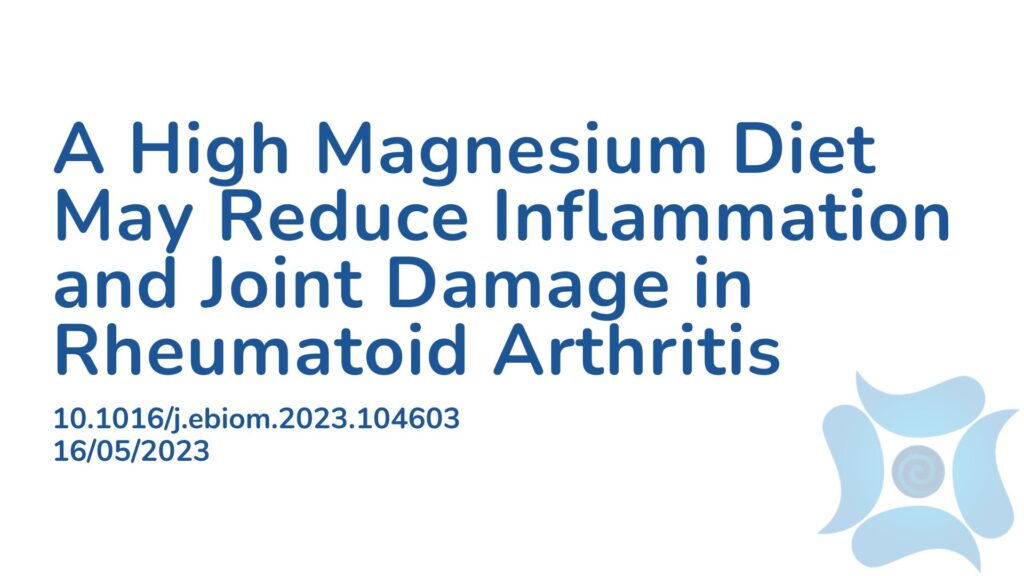Summary:
Rheumatoid arthritis (RA) is an auto-immune disease that impacts roughly 1% of the global population and is associated with increased risk of death. Whilst the genetic involvement of RA is well acknowledged in research, there is little known about the environmental or dietary contributions of this disease. Remission for RA also remains uncommon, suggesting that more research is needed to understand new and effective ways the condition can be managed and treated. This paper looked at the role of magnesium in RA, considering that a western diet is typically deficient in magnesium and it displays anti-inflammatory properties. The researchers investigated a high magnesium intake in two different mouse models with RA. The researchers also conducted analysis of the microbiome, including a fecal matter transplant to see if this impacted RA outcomes. The findings showed that the high magnesium diet group was significantly protected with reduced RA symptom severity and less joint damage. The high magnesium group also had decreased levels of inflammatory markers. The microbiome analysis revealed that the high magnesium group also had higher levels of beneficial bacteria and increased production of short-chain fatty acids. The researchers explained these results as describing a beneficial role for magnesium in RA that is modulated by the intestinal microbiome. Their discoveries suggest that modifying the intestinal microbiome may be a strategy to treat RA and other auto-immune conditions.
Abstract:
Background: Rheumatoid arthritis (RA) is a common autoimmune disease with emerging environmental and microbiome risk factors. The western diet is typically deficient in magnesium (Mg), and there is some evidence suggesting that Mg may have anti-inflammatory properties. But the actual role of Mg supplementation in arthritis or in T cell subsets has not been explored. Methods: We investigated the role of a high Mg diet in two different mouse models of RA induced with the KRN serum, and collagen-induced arthritis. We also characterized the phenotypes of splenocytes, gene expression, and an extensive intestinal microbiome analyses including fecal material transplantation (FMT). Findings: The high Mg diet group was significantly protected with reduced arthritis severity and joint damage, and reduced expression of IL-1β, IL-6, and TNFα. The high Mg group also had increased numbers of Foxp3+ Treg cells and IL-10-producing T cells. The high Mg protective effect disappeared in IL-10 knockout mice. FMT from the high Mg diet mice recreated the phenotypes seen in the diet-treated mice, with reduced arthritis severity, increased Foxp3+ Treg, and increased IL-10-producing T cells. Intestinal microbiome analyses using 16S rDNA sequencing revealed diet-specific changes, including reduced levels of RA-associated Prevotella in the high Mg group, while increasing levels of Bacteroides and other bacteria associated with increased production of short-chain fatty acids. Metagenomic analyses implicated additional pathways including L-tryptophan biosynthesis and arginine deiminase. Interpretation: We describe a new role for Mg in suppressing arthritis, in expanding Foxp3+ T reg cells and in the production of IL-10, and show that these effects are mediated by the intestinal microbiome. Our discoveries suggest a novel strategy for modifying the intestinal microbiome to treat RA and other autoimmune and inflammatory diseases.
Article Publication Date: 16/05/2023
DOI: 10.1016/j.ebiom.2023.104603



